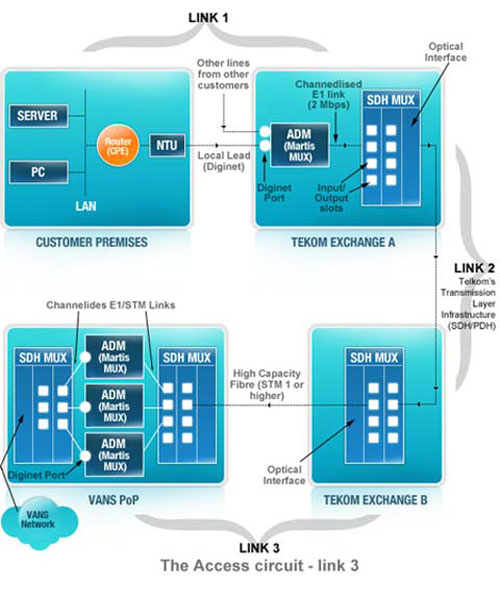
Details began to emerge this week of how Telkom allegedly used its dominant position in the broadband market to prevent its rivals from competing with it.
This was during the Competition Tribunal’s hearing into Telkom, where the fixed-line operator stands accused of abusing its dominance by charging excessive prices, refusing access to an essential facility, and engaging in price discrimination thereby making its downstream rivals less competitive in the telecommunications market.
If Telkom is found guilty in the hearing, it could face a penalty of as much as 10% of its 2003 turnover, which could be as much as R3,5bn.
The Competition Commission’s first witness was Mike Brierley, the former CEO of MTN Network Solutions who is now a telecoms consultant.
The Mail & Guardian understands that Brierley’s testimony will be key to the commission’s case but his testimony on Monday and early Tuesday was heavily focused on telecoms technology and the definitions of the various links that create a network.
By Tuesday afternoon, however, Brierley had switched focus to how Telkom had abused its dominance.
Brierley maintained that the way Telkom serviced its own clients was exactly the same way it serviced the value-added network service providers (Vans) and therefore Telkom should have billed the Vans in a similar way.
Brierley used a series of slides to explain the way Telkom priced the services to itself and the Vans.

The graphic (above) shows the customer’s premises from where data travels, the closest Telkom exchange where it arrives, the closest Telkom exchange to its final destination and then the Vans point of presence (Pop), where the Vans data flows in and out.
The first area that Brierley focused on was Link 2 between Telkom Exchange A and Telkom Exchange B.
According to Brierley, Telkom charged the Vans a different flat rate than it did its customers for Link 2 and then also charged the Vans a distance-related component, which it did not charge to its customers.
Brierley said this distance charge was “significant” and made a huge difference in Vans’ ability to compete against Telkom.
On Link 3 Telkom did not need to use that link because it could place its POP in the Telkom exchange but it would not allow the Vans to place their Pops in the exchange.
Brierley also argued that Telkom charged the Vans for equipment that was not used in Link 3, but wouldn’t charge its customers for the same.
Brierley argued that although Vans paid for the remote exchange equipment, Telkom was still billing the Vans’ customers for the last local lead that connected from Telkom Exchange B to the Vans Pop.
“So the customers are paying for something the Vans have already paid for,” said Brierley.
Excessive charges
Brierley also provided evidence of how Telkom had been charging companies excessively to connect to Europe.
Brierley said that in 2004, Telkom charged R4,8m for half an STM (fibre-optic) circuit to an exchange in London.
However, this was only half the link to Europe, the other half was available at a price of R672 000 from British Telecom as an example.
Brierley said that by April 2008, Telkom was charging 18% of the original price and by 2009 it was down to 7%.
When Telkom’s advocate, Alfred Cockerell, began cross-examining Brierley on Tuesday, he tried to paint Brierley as having an “axe to grind” with Telkom due to his role as MTN Network Solutions CEO at the time of the complaint being lodged with the commission.
Cockerell disputed Brierley’s contention about Telkom’s alleged anticompetitive pricing, taking him through his allegations step by step, and illustrating Telkom’s position on the allegations.
The case dates back to 2002 when a complaint was lodged with the commission by 21 entities. These included the SA Vans Association, the Internet Service Providers’ Association and nineteen other Vans.
By February 2004, the commission had completed its investigation and referred its case against Telkom to the tribunal. However, Telkom decided to challenge the commission’s jurisdiction in the supreme court of appeal, a legal move that resulted in a five-year delay to the tribunal hearing, but ultimately was lost by Telkom.
Some subsequent legal challenges followed based on the commission’s decision to amends its papers, which have since been resolved and the case has finally reached the tribunal.
The hearing has been set down to be heard until 28 October and will then resume between 1 and 9 December. — Lloyd Gedye, Mail & Guardian
- Visit the Mail & Guardian Online, the smart news source
- Subscribe to our free daily newsletter
- Follow us on Twitter or on Facebook




